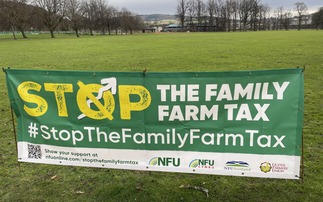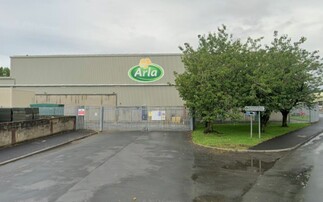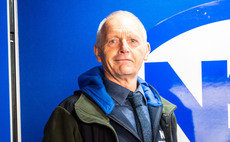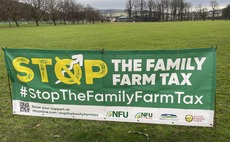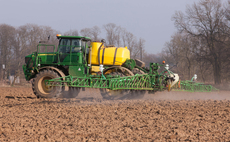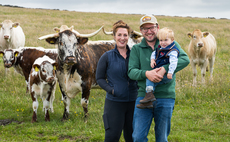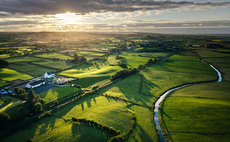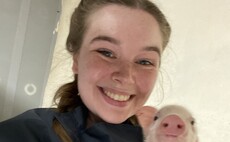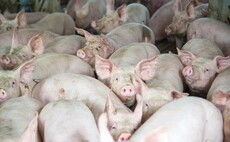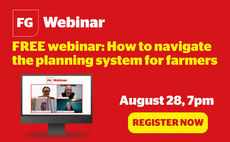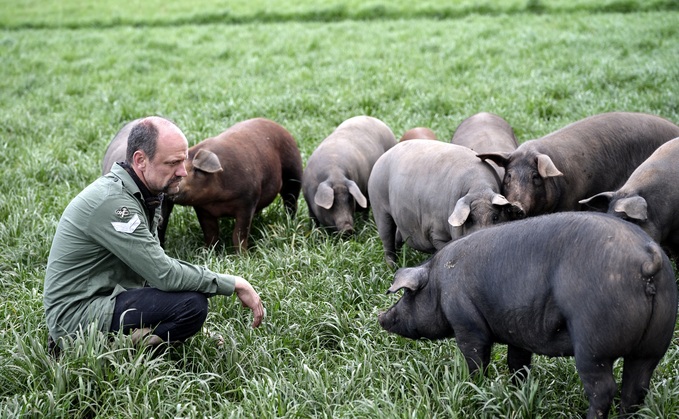
Embodying a true farm-to-fork story, Michelin star chef Brett Graham speaks about his journey from chef to farmer. Mia Willemsen finds out more.
As a three Michelin star chef, Brett Graham knows the importance of sourcing quality ingredients. In fact, he put so much emphasis on this he began his own farm too, supplying his restaurant with produce from his farming business.
READ MORE: New Lely Astronaut A5 robot automates milk filter changes for dairy farms
Owner of The Ledbury and the Harwood Arms in London as well as a farmer, Brett is working to make fine dining more sustainable and farmer-friendly through his high-end produce company Capability Graham.
He has a unique approach to running restaurants, spending a lot of his time right at the bottom of the supply chain on the farm. This is not something completely new to Brett– he grew up in Australia and spent a lot of his time at his grandparents' farm where they had cows and horses.
Brett works with an incredible team of farmers around the country who look after his Iberian pigs imported from Spain, his rapeseed oil, and his retired Jersey cows and deer, which allows him to split his time across his many roles.
He fell in love with cooking when he was just a teenager and found himself progressing fast and moving to England after winning a cooking award.
As his career took off, so did his curiosity: how could he make dishes with ingredients from sustainable sources? He is not afraid to trial and test.
"We could be on-farm and I might have 10 ideas, but I will get laughed at for eight or nine of them because they are not practical, but for one of them the farmers will go: ‘Yeah that is good, I never thought of that'," he says.
"As long as we are all open-minded, we make progress together."
Brett's focuses are on reduced output costs, environmental benefits and animal welfare standards, all with the aim of better valued products and more flavoursome ingredients.
"Learning that soy farming is a major driver of deforestation, land degradation and biodiversity loss, I wanted to find a sustainable alternative that I could cook with and feed to my animals," he says.
"Importing so much soy from another country did not make sense. In 2022, the UK imported over 340 million tonnes of soy, most of which was to feed animals – a practice I think we should change.
"At our farm in Shropshire, we harvest and cold press rapeseed oil [which is then] used in our restaurants. We refrain from using glyphosates and only apply pressure to extract the oil, creating a versatile alternative to vegetable and olive oils. The rapemeal that is left after the pressing process replaces the soy in our cows' and pigs' diet."
Pigs are a passion of Brett's, and after initially importing his first Iberian pigs in 2020, he has continued to develop genetic lines to maximise carcase conformation and marbling.
The pigs are typically reared within nine to 12 months, with most of them grazed on herbal leys across the farm.
"We are really focused on making sure the pigs live outside for most of their life on grass. You can see the difference this makes to how happy they are," he says.
When it comes to beef, Brett selects retired dairy cows from small Jersey herds between four and nine years old. They are mainly grass-fed, with minimal grain plus some rapeseed meal.
After a minimum of 120 days, Brett says there is a ‘significant transformation' resulting in an increase in intramuscular fat.
"The conversion from a cull cow to an animal that stands up to the finest beef makes this project not only positive in terms of sustainability but also adds an alternative to the mighty Belted Galloway, Shorthorn and Blue Grey," he says.
"The Jerseys have lovely marbling, delicious yellow fat and make great air-dried ham."
READ MORE: EXCLUSIVE - Graham Miles: "This is a very stressful time for our farmers"
Brett's venison comes from 900 deer including Japanese Sika, Fallow, Axis, and Rare White Harts across three deer parks including Aynhoe and Boughton House.
His passion for deer started with deer stalking and he now works with a small group of game managers and deer stalkers, so he knows exactly where all the deer come from.
"Our deer have an exceptionally low carbon footprint and require incredibly low inputs," he says.
"The quality of the grass is crucial to their diet. These animals are the ultimate sustainable protein – nothing comes close."
Supplying this produce to his restaurants and his Capability Graham produce company makes Brett hopeful that he can influence change in how sustainably food is sourced and produced.
His dishes are testament to his ethos and he is proud when his food showcases this: some honey from the bees, a little bit of ham on there, a piece of beef, one fresh pork.
He says: "This is the first step of our journey. There is still a lot more work to do and [more to] learn but I am proud of the good changes we have made and the knowledge we have spread. When I go and speak to chefs about our oil and no soy, they just do not have the knowledge and why would they?
"I did have people say to me: 'You will be bankrupt in six months if you do that – if you do not use soy'. But that was four or five years ago, and we have decent demand."
He is of course aware of the struggles farmers face when taking this initial step into regenerative agriculture, particularly the financial impacts.
"The challenge they have as farmers is that if they wake up and decide they want to make even one small regenerative change, they do not know the route to market," he says.
"Trying something new that has not been tried before is a huge risk – it can destroy a farm. This is why collaboration is important."
READ MORE: Crop crimping: Delivering weather resilience for livestock feed
The future for Brett sees an evolving sustainable approach being brought into the food industry while developing close relationships with farmers and continuously learning and improving.
Brett says: "I have huge respect for farmers and how hard they work. Lots of things grown in this country that take so much time, effort and energy are just so undervalued.
"It is about trying to get the general public to hunt out some small farms and small producers and go to a small farm shop where they know where the meat, eggs and cheese has come from and make change that way – by helping to support small farmers."








